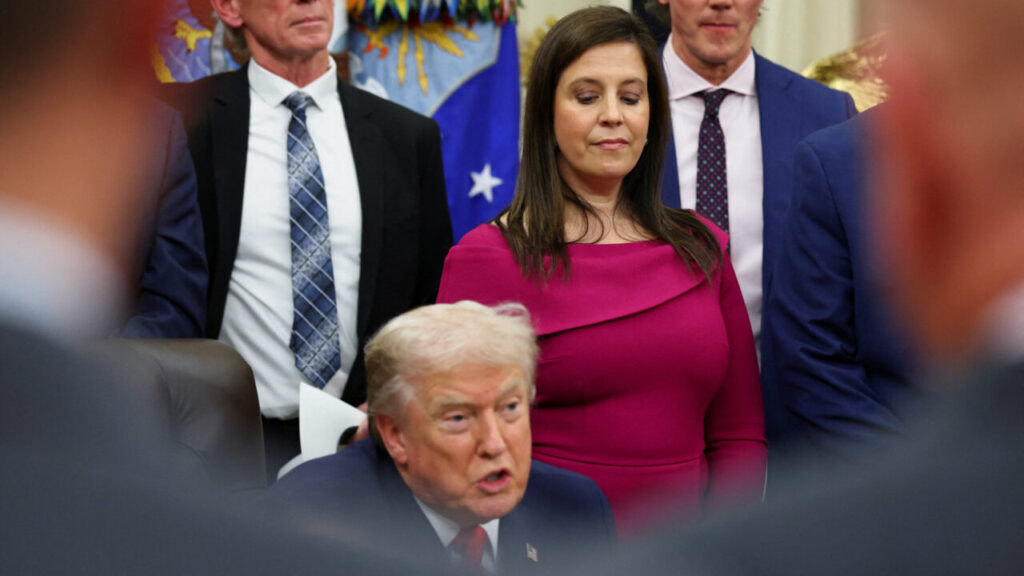The U.S. Capitol building is seen as a thunderstorm rolls through Washington, D.C., U.S., July 1, 2025. (Reuters/Elizabeth Frantz)

- Senate to vote on Trump’s $9 billion budget cuts, excluding previous plans to slash global HIV/AIDS program funding.
- Critics say cuts to foreign aid and public broadcasting undermine bipartisan agreements and erode Congress’s constitutional spending authority.
- Trump threatens to withhold endorsements from Republicans opposing rescission bill; Senate has until Friday to approve changes.
Share
|
Getting your Trinity Audio player ready...
|
WASHINGTON – The U.S. Senate is due to begin voting on Tuesday on President Donald Trump’s request to slash billions in spending on foreign aid and public broadcasting previously approved by Congress, the latest test of Trump’s control over his fellow Republicans.
However, Office of Management and Budget Director Russell Vought told reporters it will no longer include a plan to cut funds designated for PEPFAR, a global fund to fight HIV/AIDS, bringing the size of the package of cuts to $9 billion from $9.4 billion.
Senator John Thune of South Dakota, the chamber’s Republican majority leader, said he expected the first procedural voting on Tuesday. He had said that some members of his party had wanted changes in the bill.
The Senate has until Friday to act on the rescissions package, originally a request to claw back $8.3 billion in foreign aid funding and $1.1 billion for public broadcasting. Otherwise, the request will expire and the White House will be required to adhere to spending plans passed by Congress.
Approving the Senate bill without the PEPFAR cuts means the measure must go back to the House of Representatives for a vote before it can be sent back to Trump to sign into law. Thune said he expected the House would act quickly to pass the measure.
The amounts at stake are extremely small in the context of the sprawling federal budget, which totaled $6.8 trillion in the fiscal year ended September 30. Yet the proposed cuts have raised the hackles of Democrats and a handful of Republicans who saw an attempt to erode Congress’s Constitutionally mandated authority over spending.
The foreign aid initiatives in Trump’s request for cuts included lifesaving support for women and children’s health and the fight against HIV/AIDS that have long had strong bipartisan support. The package also cuts funds supporting public broadcasting, which can be the main source of news and emergency information in rural parts of the U.S.
Critics of the cuts said the amounts of money involved were small but funded essential programs that should not be cut.
“What is going on here? Does anyone stand up to these horrible, horrible cuts that hurt the American people?” Senator Charles Schumer of New York, the chamber’s Democratic leader, said on Monday.
Trump has threatened to withhold his endorsement from any member of Congress who does not vote for the measure without changes.
Past Recessions Packages Failed
Standalone presidential rescissions packages have not passed in years, with lawmakers reluctant to cede their constitutionally mandated control of government spending. During Trump’s first term in 2018, Congress members rejected Trump’s request to revoke $15 billion in spending.
Trump’s Republicans hold narrow majorities in the Senate and House. So far, they have shown little appetite for opposing his policies.
The rescissions legislation passed the House by 214-212 last month. Four Republicans joined 208 Democrats in voting against it.
Some Republican senators had expressed concern about some of Trump’s requests.
Senator Susan Collins of Maine, who chairs the Appropriations Committee, had said she opposed Trump’s request to cut funding for the global programs to fight HIV/AIDS.
Democrats have warned that the foreign aid and broadcasting cuts, which overturn spending agreements between Republicans and Democrats, could make it more difficult to negotiate the package of spending bills that must pass by September 30 to fund the government next year and avoid a shutdown.
“How are we supposed to negotiate a bipartisan deal if Republicans will turn around and put it through the shredder in a partisan vote?” asked Senator Patty Murray from Washington, the top Democrat on the appropriations committee.
Appropriations bills require 60 votes to move ahead in the Senate, but the rescissions package needs just 51, meaning Republicans can pass it without Democratic support.
—
(Reporting by Patricia Zengerle and Bo Erickson; additional reporting by David Morgan; Editing by Scott Malone and David Gregorio)
RELATED TOPICS:
Categories

Man Arrested After Report of Rifle at Porterville Target

Wall Street Climbs as Tech Rebound Gathers Momentum

Vance Refuses to Take Sides in GOP Fight Over Bigotry

‘60 Minutes’ Pulled a Segment. A Correspondent Calls It ‘Political.’















